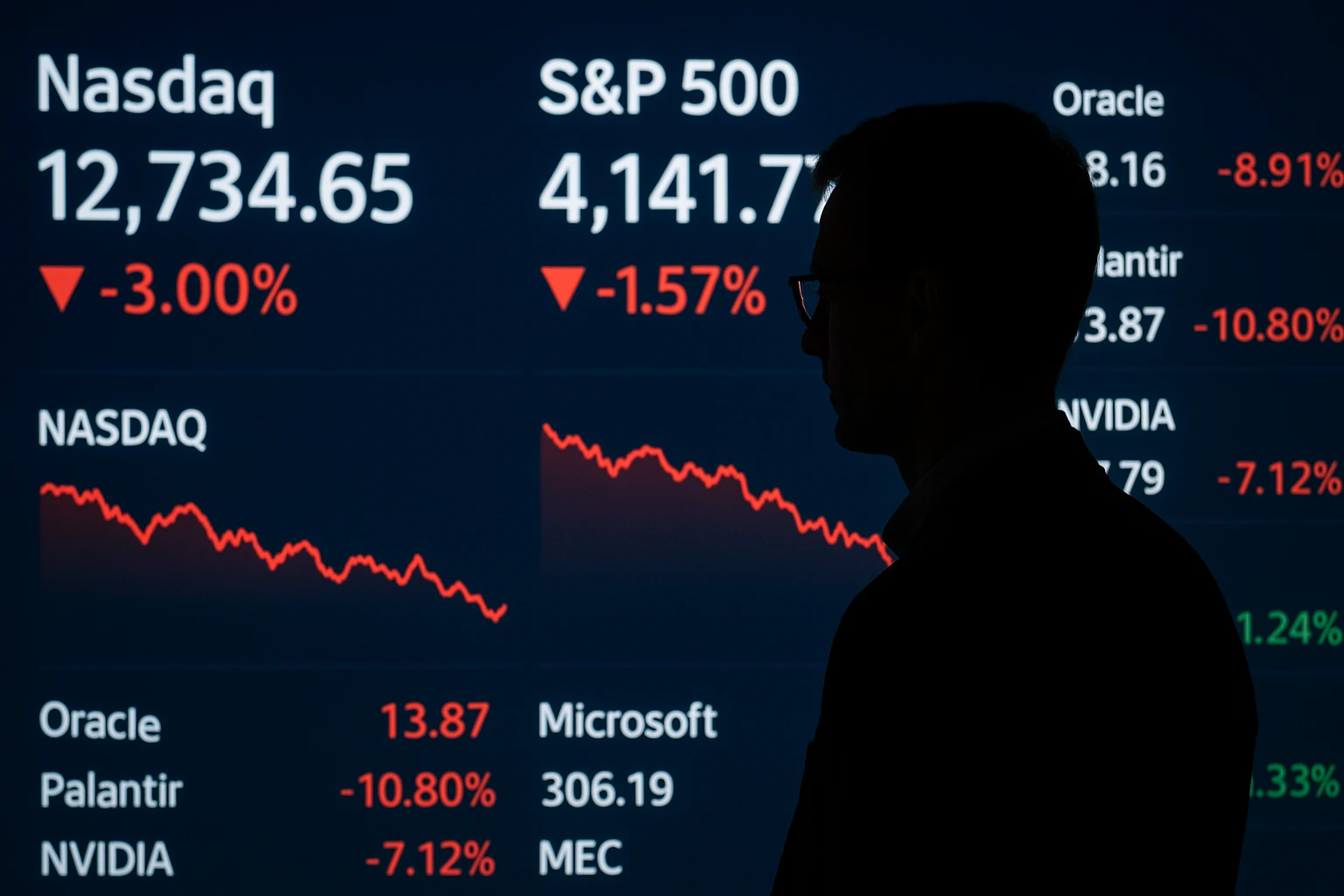NEW YORK — A downturn in technology stocks this week has raised concerns that investor confidence in artificial intelligence may be softening. The Nasdaq Composite Index fell roughly three percent, marking its worst weekly decline since April, when the US announced sweeping tariff measures.
AI focused companies, including Palantir Technologies, Oracle, and Nvidia, were among the hardest hit, while broader indices such as the S&P 500 and Dow Jones Industrial Average experienced smaller losses.
The S&P 500 slipped about 1.6 percent, and the Dow Jones Industrial Average fell approximately 1.2 percent. Market analysts attribute the gap between tech heavy indices and broader markets to the Nasdaq’s concentrated exposure to companies betting heavily on AI and other high growth technologies.
Palantir’s shares dropped around 11 percent, Oracle fell nearly 9 percent, and Nvidia lost 7 percent. Major technology firms such as Meta and Microsoft, which continue to invest aggressively in AI, saw their stock values decline about 4 percent.
Alongside market specific factors, analysts noted that broader economic conditions such as declining consumer sentiment, corporate layoffs, and the ongoing government shutdown are contributing to uncertainty in the equity markets.
“Technology valuations are high,” said Jack Ablin, chief investment officer at Cresset Capital. “In this environment, even minor negative news is magnified, and positive developments rarely move the market because expectations are already elevated.”
Sophia Tran, senior economist at the National Market Institute, said, “Tech sectors are sensitive to macroeconomic conditions. Even high potential areas like AI can be affected when the broader economy slows or consumer confidence dips.”
Experts suggest that while investors still see long term potential in AI, expectations are becoming more performance driven, focusing on tangible returns rather than speculative hype.
This week’s declines highlight the volatility of AI related stocks. Palantir recorded its sharpest weekly drop in several months. Oracle’s 9 percent fall was notable among legacy technology firms.
Nvidia, despite gains of nearly 20 percent in the past six months, fell 7 percent, illustrating the sensitivity of AI linked stocks to investor sentiment.
In contrast, the S&P 500 and Dow’s smaller losses indicate that broader market exposure to AI related risk is limited. Investor surveys show that while optimism about AI’s long term potential remains, many investors are cautious about immediate stock commitments in the sector.
Jane Phillips, a New York based investor, said she still believes in AI’s transformative potential but is concerned about current market valuations.
“AI is revolutionary, but stock prices already reflect high expectations. Any setback is amplified in this environment.” Michael Rios, a financial analyst in Chicago, highlighted broader economic factors.
“Strong AI technologies can’t fully shield companies from slowing consumer demand and macroeconomic uncertainty,” he said. These perspectives underscore the balancing act investors face: enthusiasm for AI’s promise versus caution around near term risks.
Despite the recent losses, analysts caution against interpreting this week’s decline as a collapse in investor confidence. Companies continue to expand AI research, hire talent, and explore new applications across enterprise, cloud computing, and consumer markets.
“Short term volatility is normal in a fast evolving sector like technology,” Ablin said. “AI remains a growth engine, and these dips may create opportunities for long term investors.”
Market watchers note that investor focus is shifting toward measurable results, such as revenue growth, profitability, and sustainable business models in AI.
Companies that can demonstrate tangible returns are expected to regain investor confidence more quickly. The recent downturn in technology stocks highlights the fine line between optimism and caution in the AI sector.
While weekly declines have sparked concern over investor confidence in AI stocks, the long term trend of corporate investment in artificial intelligence remains strong.
Investors appear increasingly focused on performance metrics, timing, and the pace at which AI investments translate into measurable returns.
